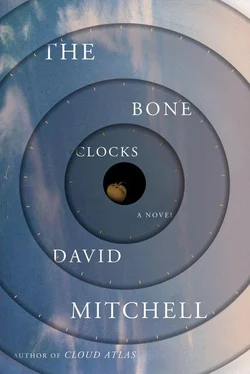What could it possibly mean, Mrs. Vasilisa Koskov?
PLEASED AS VASILISA’S husband was by the improvement in his wife’s nerves, Dmitry Nikolay was anxious about her being suckered yet again by yet another wily peasant. So the cleric interviewed me in the empty church. I wore a shy bewilderment at being noticed, let alone spoken to, by so august a figure, even as I nudged Dmitry towards a belief that here was a child destined for a higher purpose, a purpose that he, Father Dmitry Koskov, had been chosen to oversee. He asked me about my dream. Could I describe the lady I had seen? I could. She had dark brown hair, a lovely smile, a blue veil, no, not white, not red, but blue, blue like the sky in summer. Father Dmitry asked me to repeat the “strange words” the lady had told me. Little Klara frowned, and very shyly confessed that the words didn’t sound like Russian words. Yes, yes, said Father Dmitry, his wife had said as much; but what were these words? Could I remember any? Klara shut her eyes and quoted, in Greek, Matthew 19:14: But Jesus said, Suffer little children, and forbid them not, to come unto me: for such is of the kingdom of heaven.
The priest’s eyes and mouth opened and stayed open.
Trembling, I said I hoped the words meant nothing bad.
My conscience was clean. I was an epiphyte, not a parasite.
A few days later, Father Dmitry approached Sigorsky, the estate bailiff, to propose that Klara be allowed to live in their house, in order for his wife to train the girl as a servant for the Berenovksy house and give her a rudimentary schooling. Sigorsky granted this unusual request as pro bono payment for Father Dmitry averting his priestly gaze from the bailiff’s assorted scams. I had no goods to bring with me to the Koskovs’ cottage but a sackcloth dress, clogs, and a filthy sheepskin coat. That night Vasilisa gave me the first hot bath I’d enjoyed since my death in Japan, a clean frock, and a woolen blanket. Progress. While I was bathing, Klara’s mother appeared, demanding a rouble “for compensation.” Dmitry paid, on the understanding that she would never ask for another. I saw her around the estate, but she never acknowledged me, and the following winter, she fell drunk into a frozen ditch at night and never woke up.
Even a benign Atemporal cannot save everyone.
THE CLAIM IS immodest, but as a de facto if not a de jure daughter, I’d brought purpose and love back into the Koskovs’ life. Vasilisa set up a class in the church to teach the peasant children their ABBs, basic numeracy, and scripture, and found time in the evening to teach me French. Lucas Marinus had spoken the language in my previous life, so I made a gratifyingly quick-learning student. Five years passed, I grew tall and strong, but every summer when Berenovksy visited, I dreaded his noticing me in church, and asking why his serf was being given airs above her natural station. In order to protect my gains and carry on climbing, my benefactors needed a benefactor.
Dmitry’s uncle, Pyotr Ivanovich Chernenko, was the obvious, indeed the only, candidate. Nowadays he would be fêted as a self-made entrepreneur, with a gossip-magazine private life, but as a young man in nineteenth-century Saint Petersburg he had caused a scandal by eloping with and, even worse, marrying an actress five years his senior. Dissipation and disgrace had been gleefully predicted, but Pyotr Ivanovich instead had made first one fortune by trading with the British against the continental blockade, and was now making another by introducing Prussian smelters to foundries throughout the Urals. His love marriage had stayed strong, and the two Chernenko sons were students in Gothenburg. I persuaded Vasilisa that Uncle Pyotr must be invited to our cottage to inspect her estate school when he was next in Perm on business.
He arrived one morning in autumn. I ensured I shone. Uncle Pyotr and I spoke for an hour on metallurgy alone. Pyotr Ivanovich Chernenko was a shrewd man who had seen and learned a lot from his five decades of life, but he was beguiled by a serf girl who was so conversant on such manly concerns as commerce and smelting. Vasilisa said that the angels must whisper things in my ears as I slept. How else could I have acquired German and French so quickly, or known how to set a broken bone, or have grasped the principles of algebra? I blushed and mumbled about books and my elders and betters.
That night as I lay in bed I heard Uncle Pyotr Ivanovich tell Dmitry, “One bad-tempered whim of that ass Berenovksy, nephew, is all it needs to condemn the poor girl to a life of planting turnips in frozen mud and the spousal bed of a tusked hog. Something must be done! Something shall be done!” Uncle Pyotr left the next day in never-ending rain-spring and autumn alike are muddy hell in Russia-telling Dmitry that we had rotted away in this backwater for far too long already …
• • •
THE WINTER OF 1816 was pitiless. Dmitry buried about fifteen peasants in the iron-hard sod, the Kama River froze, the wolves grew bold, and even priests and their families went hungry. Spring refused to show until the middle of April, and the mail coach from Perm didn’t resume its regular visits to Oborino County until May 3. Klara Marinus’s journal marks this as the date when two official-looking letters were delivered to the Koskovs’ cottage. They stayed on the mantelpiece until Dmitry returned in the late afternoon from administering last rites to a woodcutter’s son, who had died of pleurisy several miles away. Dmitry opened the first letter with his paper knife and his face reflected the momentousness of its news. He puffed out his cheeks, said, “This affects you, Klara, my dear,” and read it aloud: “ ‘Kiril Andreyvich Berenovsky, Master of the Berenovksy Estate in the Province of Perm, hereby grants to the female serf Klara, daughter of the deceased serf Gota, full and unconditional liberty as a subject of the Emperor, in perpetuity.’ ” In my memory, cuckoos are calling across the river and sunshine floods the Koskovs’ little parlor. I asked Dmitry and Vasilisa if they would consider adopting me. Vasilisa smothered me in a tearful hug while Dmitry coughed, examined his fingers, and said, “I dare say we could manage that, Klara.” We knew that only Pyotr Ivanovich could have brought about this administrative miracle, but some months would pass before we learned exactly how. My freedom had been granted in exchange for Uncle Pyotr settling my owner’s account with his vintner.
In our excitement, we’d forgotten the second envelope. This contained a summons from the Episcopal Office of the Bishop of Saint Petersburg, requesting Father Dmitry Koskov to take up his new post as priest at the Church of the Annunciation of the Blessed Virgin on Primorsky Prospect, Saint Petersburg, on or before July 1 of that year. Vasilisa asked, quite seriously, if we were dreaming. Dmitry handed her the letter. As Vasilisa read it, she grew ten years younger before our eyes. Dmitry said he shuddered to think what Uncle Pyotr had paid for such a plum post. The answer was a consignment of Sienna marble to a pet monastery of the patriarch’s but, again, we didn’t hear this from Pyotr Ivanovich’s lips. Human cruelty can be infinite. Human generosity can be boundless.
NOT SINCE THE late 1780s had I lived in a sophisticated European capital, so once we were installed in our new house by Dmitry’s church in Saint Petersburg, I engorged myself on music, theater, and conversation, as best a thirteen-year-old freed serf girl could. While I was expecting my lowly origins to be an obstacle in society, they ended up enhancing my status as an event of the season on the novelty-hungry Petersburg salon circuit. Before I knew it, “Miss Koskov the Polymath of Perm” was being examined in several languages on many disciplines. I gave my foster mother due credit for my “corpus of knowledge,” explaining that once she had taught me to read I could harvest at will the fruits of the Bible, dictionaries, almanacs, pamphlets, suitable poetry, and improving literature. Emancipationists cited Klara Koskov to argue that serfs and their owners differed only by accident of birth, while skeptics called me a goose bred for foie gras, stuffed with data I merely regurgitated without understanding.
Читать дальше












